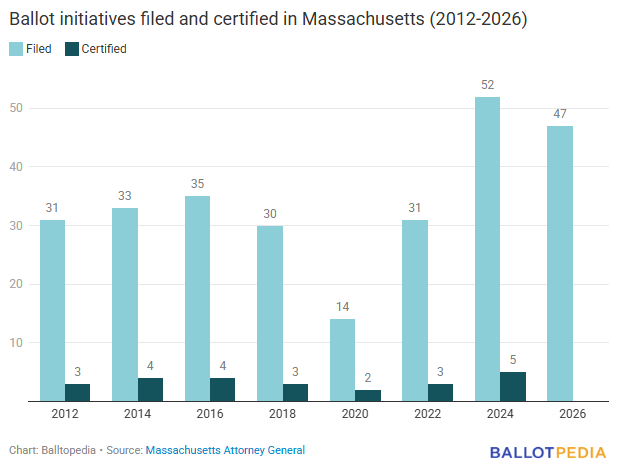In Massachusetts, the initiative filing deadline for the 2026 ballot was Aug. 6. Initiative sponsors filed 47 measures (42 initiated state statutes and five initiated constitutional amendments) by the deadline. The 42 initiated state statutes could be placed on the 2026 ballot. Constitutional amendments require a longer approval process, meaning the five initiated constitutional amendments could not be placed on the ballot until 2028.
The average number of initiatives filed between 2012 and 2024 in Massachusetts was 32. The greatest number of initiatives, 52, were filed for the 2024 ballot. An average of three initiatives made the ballot.

The Massachusetts initiative process requires the attorney general to determine if an initiative meets the requirements, and to report by the first Wednesday in September (Sept. 3, 2025), which of the 42 state statutes and the five constitutional amendments are cleared for signature gathering. The requirements include that an initiative must address a single subject and may not address any restricted subjects, such as religion, the judicial system, the prohibition of alcohol, or the state declaration of rights. Those initiatives that do meet the requirements will then have until Dec. 3 to submit 74,574 valid signatures to send the initiative to the state legislature for their action.
In 2023, sponsors filed an initiative that would have permitted same-day voter registration in Massachusetts. However, they were not able to gather sufficient signatures to place the initiative on the ballot. This year, another initiative was filed that would permit same-day voter registration.
Additionally, in 2023, sponsors filed an initiative that would have required voters to present a photo ID at the polling place, but they submitted insufficient signatures to place the initiative on the ballot. This year, an initiative was filed that would require a photo ID for both in-person voters and absentee ballots. Currently, Massachusetts does not require voters to present identification while voting, unless the voter is:
- Voting for the first time in Massachusetts in a federal election;
- An inactive voter;
- Casting a provisional or challenged ballot; or
- Requested to present identification by a poll worker.
Also filed this year was an initiative that would repeal the 2021 Massachusetts Bay Transportation Authority (MBTA) zoning law. That law requires that in 177 specified communities in the state, there must be at least one zoning district where multi-family housing is permitted without requiring special permission from the city.
Other topics of the 47 potential measures include civil and criminal penalties for marijuana use, public status of the state voter registry, rent control, self-driving vehicles, gas taxes, and the state income tax.
In Massachusetts, citizens have the power to indirectly initiate constitutional amendments, state statutes, and veto referendums. These powers were established with voter approval of a ballot measure in 1918. Indirect initiatives are considered by the state legislature, which can approve state statutes outright, take no action and send the amendment or statute to the ballot, amend the initiated amendment with a 75% vote of the state legislature, or propose an alternative alongside the initiated amendment.
For indirect-initiated state statutes, sponsors must collect signatures equal to 3.5% of the votes cast in the last gubernatorial election in two rounds. For indirect constitutional amendments, the number of signatures required is equal to 3% of the votes cast in the last gubernatorial election. Massachusetts also has a signature distribution requirement; no more than 25% of the certified signatures on any petition can come from a single county.
Additional reading: Massachusetts voters decided on 231 ballot measures since 1910



